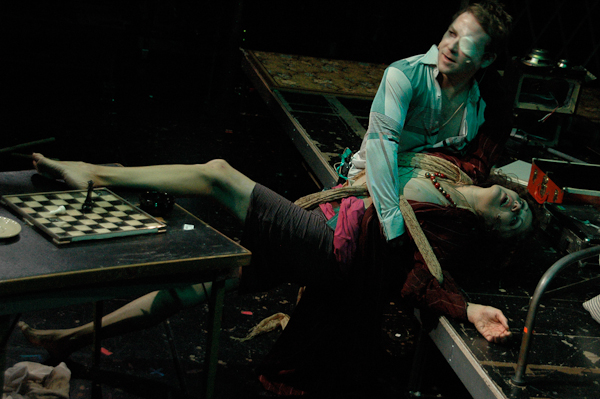By James Jorden
I’m not the type to say “my head is still reeling,” but, go figure, my head is still reeling from seeing Vieux Carré performed by the Wooster Group last night. I’m not going to pretend to review this masterpiece (what could I say besides “oh, my God!” over and over again), but rather I’m going to take the opportunity to go off on a tangent.
And that tangent is: until today I had never read Vieux Carré, and certainly I had never seen this lateish and unpopular Tennessee Williams piece performed. Going into the show I had only a vague idea of what the show was about: set in the French Quarter, obviously, by the title, some notion that it took place in a boarding house or hotel of some sort, and as I settled into my curious tip-up banquette seat on the seventh floor of the Baryshnikov Arts Center, my companion glanced at the program and said, “oh, it’s a memory play.”
Then the performance started, and continued for two intermissionless hours, thus forestalling any comparing of notes. I was on my own with a firmly non-literal production of an unknown text and… well, what do you know? I totally got Vieux Carré.
That’s not boasting. I think pretty much everybody else there got it too, and, what’s more, I think they got more of the play than they might have got from a more “respectful” production.
Why? Well, for one thing, the text was handled with the highest esteem. Every word was clear, and, even more importantly, I think, the text wasn’t “acted,” broken up with methody pauses and pseudo-realistic mumbles. It helps that some, or maybe all the actors are miked and so much of the time they can speak at a really conversational level. The Writer (Ari Fliakos) sounded at times like he was whispering in my ear, which is after all entirely appropriate for the sort of intimate confessions he’s (just barely) sharing.
Another point, and I can’t say this would work for all or even most plays, is that the attitude taken toward the text was one of love rather than reverence. Someone or something you love you can joke with, tolerate, enjoy their faults as part of the lovable whole. What’s revered must always be treated with great seriousness and its flaws glossed over or rationalized.
And Vieux Carré is a spectacularly flawed text. It’s hardly a coincidence, surely, that the landlady Mrs. Wire is constantly simmering gumbo, because that’s what this play is like: highly spiced, fatty, stuffed full of about a dozen kinds of animal protein, then overcooked until slimy. If you treated this hodgepodge with reverence, the result would be either be unbearable or else lapse into low camp, and Williams, even lower-drawer Williams, deserves far better than that.

Instead, this company and this production loves the play, enjoys its flaws, and even lovingly makes fun of its purplest passages. When fading socialite Jane reflects, “I guess I’m a Yellow Cab girl with limousine aspirations,” Kate Valk doesn’t pretend that it’s anything a human being might ever say; instead she performs it as the minor bon mot it is and gets from the audience a decent-sized laugh—a loving laugh with empathy for a creature so emotionally hard up she has to resort to such desperately arch verbal posturing.
Thus, since the actors share with the audience the knowledge that the play is (to put it mildly) imperfect, we all have permission to admire its surprisingly frequent beauties, in particular the way Williams melds the raunchy four-letter stage vocabulary of the 1970s with his shimmering hothouse verbal imagery of three decades before.
“Definitive” is a word I get the feeling the people at Wooster Group would find pretty silly, so I’ll put this another way. Their eccentric, willful, elliptical take on this play seems to me so strong and so true that I can’t quite imagine seeing it any other way.
Image: Ari Fliakos and Kate Valk in Vieux Carré, as performed at REDCAT. Photo by Nancy Campbell.
Tags: regie, tennessee williams, wooster group